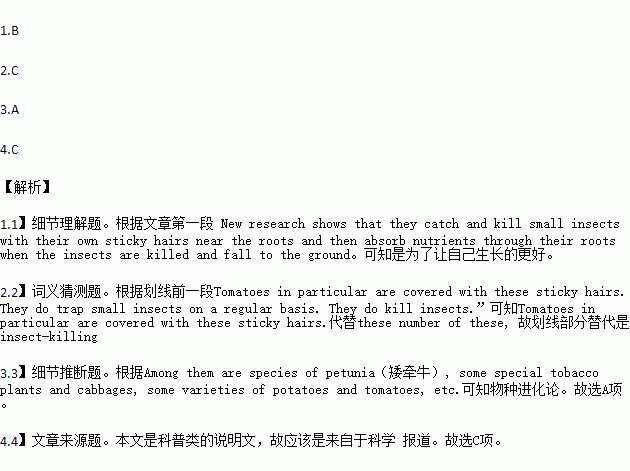题目内容
For the first time, researchers have discovered that some plants can kill insects in order to get additional nutrients. New research shows that they catch and kill small insects with their own sticky hairs near the roots and then absorb nutrients through their roots when the insects are killed and fall to the ground.
Professor Mark Chase, of Kew and Queen Mary, University of London, said: “The cultivated (改良的) tomatoes and potatoes still have the hairs. Tomatoes in particular are covered with these sticky hairs. They do trap small insects on a regular basis. They do kill insects.”
The number of these carnivorous plants is thought to have came up to 50 percent and many of them have until now been wrongly regarded as among the most harmless plants. Among them are species of petunia(矮牵牛), some special tobacco plants and cabbages, some varieties of potatoes and tomatoes, etc. Researchers at Royal Botanical Gardens Kew, which carried out the study, now believe there are hundreds more killer plants than previously realized.
It is thought that the technique was developed in the wild to get necessary nutrients in poor quality soil – and even various plants grown in your vegetable garden still have the ability.
The researchers, publishing their finding in the Botanical Journal of the Linnean Society, said: “We may be surrounded by many more murderous plants than we think.” “We are accustomed to thinking of plants as being immobile and harmless, and there is something deeply frightening about the thought of meat-eating plants," they added.
1.Tomatoes and potatoes kill insects to _____.
A. get more sticky hairs
B. make themselves grow better
C. make their roots stronger
D. avoid falling down to the ground
2.The word “carnivorous” in Paragraph 3 most probably means _____.
A. fast-growing
B. harmless
C. insect-killing
D. nutritious
3.The insect-killing technique of vegetables is developed most probably through _____.
A. evolution of species
B. helps from other garden plants
C. artificial cultivation
D. nutrients preserved in rich soil
4.The text is probably taken from _____.
A. a student book
B. a science fiction
C. a scientific repot
D. a bulletin board

